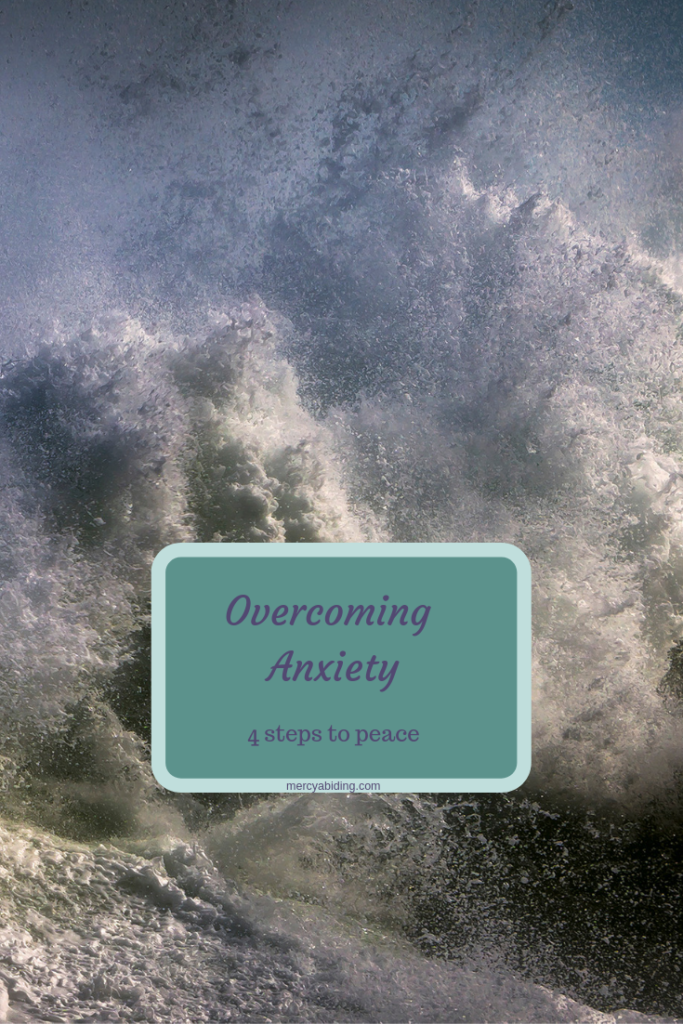
Your mind spins round and round. You have trouble catching your breath. Your stomach goes from jelly to tied in knots and back to jelly. The trio of fear, worry, and anxiety is gnawing away at your peace like a rodent gnaws a hole in a wall.
Dictionary.com defines the words this way:
Fear – a distressing emotion aroused by impending danger, evil, pain, etc., whether the threat is real or imagined. Worry – to torment oneself with or suffer from disturbing thoughts. Anxiety – distress or uneasiness of mind due to fear of danger or misfortune; greatly worried.
What words jump out at you? I see distress, torment, uneasiness, danger, misfortune, pain, evil. And as far as your body’s reaction, the threat doesn’t have to be REAL! Have you ever done that? Got yourself all tied up in knots and when you stop to really think about it, the premise is absurd? Like, bitten by a shark in Missouri absurd?
Those instances are pretty easy to deal with. But what about the ones where the fear is real? He really did cheat. The doctor did say cancer. I was mugged. We are one bad week away from not paying the mortgage. That person at work keeps telling the boss lies about you. The unthinkable is happening. Especially when there is no action you can take, nothing you can change, nothing to do but let things happen. What then?
The same Jesus who says, “In this world you will have trouble,” (John 16:33) also says, “my peace I give you” (John 14:27). But how do you apply all the passages about not fearing, not having anxiety, living in peace? I see a strategy for peace in Philippians 4.
Rejoice in the Lord always. I will say it again: Rejoice! Let your gentleness be evident to all. The Lord is near. Do not be anxious about anything, but in everything, by prayer and petition, with thanksgiving, present your requests to God. And the peace of God, which transcends all understanding, will guard your hearts and your minds in Christ Jesus.
Finally brothers, whatever is true, whatever is noble, whatever is right, whatever is pure, whatever is lovely, whatever is admirable – if anything is excellent or praiseworthy – think about such things. Whatever you have learned or received or heard from me, or seen in me – put it into practice. And the God of peace will be with you.
Philippians 4:4-9
Remember
First we are to remember that the Lord is near. Even if it seems like he is very far away. In fact, the more I focus on my situation and the fear surrounding it, the less I believe in God’s nearness. I have to force myself to forget what I feel and believe that he is indeed near. Grab hold of that fact and hang on to it regardless of what our feelings may scream. In that remembering we can rejoice.
Not that it is easy. When I am in periods of deep stress and sorrow, I have to remind myself that God is near over and over again. Every time anxiety threatens my peace.
Pray to the God of Peace
Next, instead of being consumed by our anxiety, we are to pray about everything. Petition God with thanksgiving. When I was going through an especially rough spot, I found myself waking up at night. This was yet another reminder to pray about the situation causing such anxiety. Sometimes I might be praying four or five times a night! But my prayers allowed God’s peace to guard my heart so that I could go back to sleep again.
One thing that I find especially helpful is to pray scripture. During my Bible reading, God will usually point out a verse that applies to my situation and I then will meditate on that passage and pray it back to him. My prayer might sound like, “God, I feel abandoned and alone, but you say that you will never leave me not forsake me. Surround me with your love. Help me to know that even as I walk through the valley you are with me and you will comfort me.”
Think
When I am feeling anxious, it is easy to dwell on negative things. The situation, my feelings, etc. But this can lead to my thoughts spiraling downward (since I am already prone to depression). But Paul exhorts us to dwell instead on things that are true, noble, right, pure, lovely, admirable, excellent, and praise-worthy.
Even in the darkest circumstances there is a benefit for bringing our thoughts in line with the traits above. When my marriage was in a bad place, it was easy to dwell on the negative, but by an effort of bringing my thoughts in line with truth, I had to admit that it was not all bad. There was good in the past, good in the now, and the hope of good again. I just had to be willing to see it and re-align my thoughts to God’s best for me.
Act
The last piece of advice Paul gives is to act on what we know. It is not enough to have head knowledge of the things of God – what we have learned and received – we have to put them into practice. By acting on the truth that God reveals, by believing that he is near, praying with thanksgiving, and re-aligning our thinking with his truth, then we will know his peace. And his peace guards our hearts and minds, becoming a hedge of protection against all the anxiety that threatens to overwhelm and destroy us.
